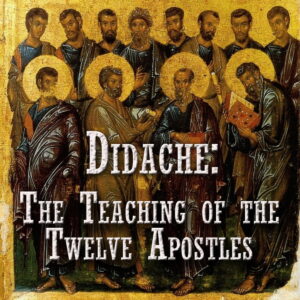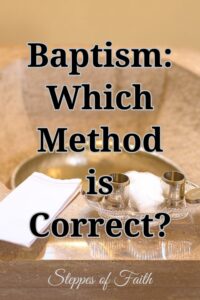
“Then those who gladly received his word were baptized.” Acts 2:41
The Greek term for baptism is baptizo. It has various meanings; it can mean to dip, wash, immerse (not go fully underwater), or saturate in water. Evangelicals tend to agree with the latter. The idea is one confesses their faith, goes underwater, and emerges as a “new creation.” The old way of life is gone, and one now sees everything through the lens of Jesus Christ.
“Therefore, if anyone is in Christ, he is a new creation; old things have passed away; behold, all things have become new.” (2 Cor 5:17)
Baptism by full submersion, called the “believer’s baptism” or credobaptism, is based on Matthew 28.
“Go, therefore, and make disciples of all the nations, baptizing them in the name of the Father and of the Son and of the Holy Spirit.” (Mt 28:19)
In Matthew 28, Jesus speaks to the twelve disciples after His resurrection and instructs them on their next steps to establish the early church. He gives His instruction in a specific order—first, make disciples, then baptize them in the Trinitarian name of the Father, Son, and Holy Spirit.
His instruction seems to imply that believers experience baptism in a public setting. By doing so, they make known their embrace of the church’s (and, therefore, the Bible’s) teachings and publicly declare their identification with Jesus’ death and burial (going underwater) and resurrection (emerging from the water).
“Or do you not know that as many of us as were baptized into Christ Jesus were baptized into His death? Therefore, we were buried with Him through baptism into death that just as Christ was raised from the dead by the glory of the Father, even so we also should walk in newness of life.” (Romans 6:3-4)
According to Matthew 3:16, John the Baptist baptized Jesus by full submersion, and Philip baptized the Ethiopian eunuch the same way in Acts 8:38-39. Full submersion makes sense as it relates to how faith in Jesus washes away our sins and removes God’s judgment from us (Acts 22:16; 1 Peter 3:20-21).
But not everyone agrees.
Baptism by Sprinkling
Most churches agree with evangelicals that baptism is a commencement to join the church, but that is where it sometimes stops.
Some churches do not believe only believers can be baptized, i.e., one does not need a profession of faith in Jesus to receive baptism. These churches are called “paedobaptists.”
Paedobaptists tend to practice sprinkling water as a preferred method. They argue that Jesus may have been submerged in water but claim the Bible contains other instances where submersion would have been impossible. They point to Acts 2:41, 8:38, and 16:33 as examples.
Acts 2:41, “Then those who gladly received his word were baptized (baptizo, submerged).” (my addition)
Acts 8:38, “Then he commanded the chariot to stand still. And both Philip and the eunuch went down into the water, and he baptized him.”
Acts 16:33, “And he took them the same hour of the night and washed their stripes. And immediately he and all his family were baptized.”
The thought is if the Bible describes times of sprinkling water instead of fully submerging a consenting believer, then sprinkling must be okay. However, in each of their cited verses, the original Greek translation submersion in water.
Infant Baptism
Many paedobaptists believe infant baptism is a sign of God’s covenant with man, based on Colossians 2:11-12. To them, this verse equates New Testament water baptism with Old Testament infant circumcision as a sign of one’s salvation.
“In Him, you were also circumcised with the circumcision made without hands by putting off the body of the sins of the flesh by the circumcision of Christ, buried with Him in baptism in which you also were raised with Him through faith in the working of God, who raised Him from the dead.”
The Bible gives no clear examples of infant baptism. It seems to have come into broader practice sometime in the late fourth or early fifth century. However, the Bible does say entire households, which may or may not have included infants, received baptisms (Acts 16:5, 30-31, 18:8; 1 Cor 1:16).
First Corinthians 7:14 also says infants are “holy” through their parents’ sanctification in Christ. However, these Scriptures still give no clear indication or instruction about infant baptisms.

Baptismal Regeneration
Still others believe that baptism is through the Holy Spirit, called “baptismal regeneration.” They tend to believe baptism is necessary for salvation and prefer pouring rather than sprinkling water, based on Acts 2:17.
“And it shall come to pass in the last days, says God, that I will pour out of My Spirit on all flesh.”
Acts 2:17 and its subsequent verses are based on the prophet Joel’s prediction of the Holy Spirit moving in the hearts of the Jewish people during the future Tribulation period. However, regenerationists associate it with water baptism and the pouring out of God’s spirit. If God pours out His spirit, then water should be, too, to receive salvation.
Though many churches agree with the tenet of baptismal regeneration (renewal through water baptism), regenerationists generally believe baptism is required to receive complete salvation. One such church is the Church of Christ. They believe God will not grant salvation until one completes four steps: belief, repentance, confession, and baptism.
Salvation by Process?
Promoters of baptismal regeneration point to several Scriptures to support their four-step belief, but their interpretation takes the verses out of context.
- Mark 16:16, “He who believes and is baptized will be saved, but he who does not believe will be condemned.” This verse does not teach that baptism saves, but rather a belief that Jesus is the promised Messiah does. Condemnation awaits those who do not believe.
- John 3:5, “Jesus answered, ‘Most assuredly, I say to you unless one is born of water and the Spirit, he cannot enter the kingdom of God.’” This verse is not about water baptism but spiritual cleansing through the power of the Holy Spirit through the Word of God. Ephesians 5:26 and Titus 3:5 both support this interpretation.
- Acts 2:38, “Then Peter said to them, ‘Repent and let every one of you be baptized in the name of Jesus Christ for the remission of sins, and you shall receive the gift of the Holy Spirit.’” Peter publicly invites the public to be baptized, but he is not promoting salvation through baptism. He writes later in 1 Peter 3:20-21 that baptism does not produce forgiveness. Therefore, a better translation of “for the remission of sins” is “because of the remission of sins.”
- Acts 22:16, “Arise and be baptized and wash away your sins, calling on the name of the Lord.” Luke’s writing here is grammatically incorrect. A better sentence structure is to call on the name of the Lord first and then be baptized. Romans 10:9-10,13 supports this better understanding.
- Galatians 3:27, “For as many of you as were baptized into Christ have put on Christ.” Here, Paul uses baptism metaphorically to speak about being immersed in Christ by putting our faith and trust in Him alone. John 3:16 and Acts 16:30-31 also support salvation through faith in Christ alone.
Certain regenerationists might deny that the four steps are necessary for salvation but are nevertheless “works of obedience,” which is contradictory. However, one could reasonably argue that an unwillingness to undergo baptism is an indication that one is not ready to identify with Christ’s death and resurrection (Romans 6:3-4). Such a person likely has not put their complete faith in Him (2 Cor 5:17).

The Didache and Baptism
The Didache, also called The Lord’s Teaching Through the Twelve Apostles to the Nations or The Teaching of the Twelve Apostles, is an anonymous text written in the second century. Written in Greek, the Didache served as a brief essay or manual about how early Christian communities should live. In chapter seven, the Didache outlines how a church should conduct baptism.
“And concerning baptism, baptize this way: Having first said all these things, baptize into the name of the Father, and of the Son, and of the Holy Spirit, Matthew 28:19 in living water. But if you have not living water, baptize into other water; and if you cannot in cold, in warm. But if you have not either, pour out water thrice upon the head into the name of Father and Son and Holy Spirit.”
The Catholic Church bases its baptism practices on the Didache plus other catechisms. Here, in chapter seven, the Didache instructs the church to baptize with living water, a literal open body of water (river, lake, ocean, etc.). If there is no open body of water nearby, the church can baptize by pouring cold water on one’s head.
The instruction was suitable for the early church but is irrelevant when large bathtubs are commonly available in modern times. Therefore, pouring or sprinkling can be considered an outdated mode of baptizing and not equal to or substitutionary for submersion, according to the Didache.
Reliance on Deuteronomy
Some modern church leaders might argue that God commanded the chief priests to “wash their hands over the heifer whose neck was broken,” referring to Deuteronomy 21:6 as justification for sprinkling or pouring water. In their minds, such an act could be considered a kind of baptism.
However, the original Hebrew word used for “wash” in Deuteronomy 21:6 is rachats, which involves washing one part of the body—hands, feet, face, or clothes—as a symbolic act of declaring innocence (such as Pontius Pilate did, Matthew 27:24) or a symbolic act of cleansing someone from sin. It does not refer to water baptism. Therefore, the reliance on Deuteronomy 21:6 to justify baptism by pouring or sprinkling is flawed.
What Early Church Writers Say
Some non-evangelical churches also rely on early church writers, such as Hippolytus, Cyprian, Pope Cornelius, and Tertullian, to support their sprinkling beliefs. Unfortunately, they misinterpret these writings.
- Hippolytus reserves his support for sprinkling or pouring in The Apostolic Tradition for a time when an area is experiencing an environmental drought.
- Pope Cornelius supports sprinkling in his Letter to Fabius of Antioch as does Cyprian in his Letter to a Certain Magnus. However, both teach sprinkling is permissible only if one is too ill, weak, or near death for submersion.
- Tertullian’s words in his dissertation On Baptism seem to argue against the need for baptism entirely:
“So that from the very fact, that with so great simplicity, without pomp, without any considerable novelty of preparation, finally, without expense, a man is dipped in water, and amid the utterance of some few words, is sprinkled, and then rises again, not much (or not at all) the cleaner, the consequent attainment of eternity is esteemed the more incredible.”
According to Tertullian, people who undergo submersion do not seem any cleaner once they emerge, so why bother? To him, how one achieves eternal life by going through an entire process is impossible for him to comprehend.
It should be noted that certain non-evangelical churches do believe that baptisms can also be by submersion, but it is not required. With a reliance on passages such as Deuteronomy 21:6, they believe it is just as good to experience baptism by sprinkling as it is with submersion.
Baptism is an important step in a believer’s life, but how we experience it can differ depending on the church we attend. Whether by submersion, sprinkling, or pouring, one thing is clear—God’s word does not require baptism for salvation. Remember Paul’s simple reply to the Philippian jailer who asked him what he should do to receive eternal life. We only need to do one thing.
“Believe on the Lord Jesus Christ, and you will be saved.” (Acts 16:31)

Tell me more about the message, I am not understanding the concept.
Some religions, including certain factions of Christianity, believe it is possible to baptize someone after they die, thinking it will help their loved one get to heaven. It is not a physical baptism; No one is baptizing a corpse. It is entirely symbolic. We must remember that baptism is simply an outward, public expression of our faith, like a wedding ring is an outward, public expression of marriage. It cannot save us. Only by putting our faith in the Lord Jesus Christ will we be saved and experience eternal life.